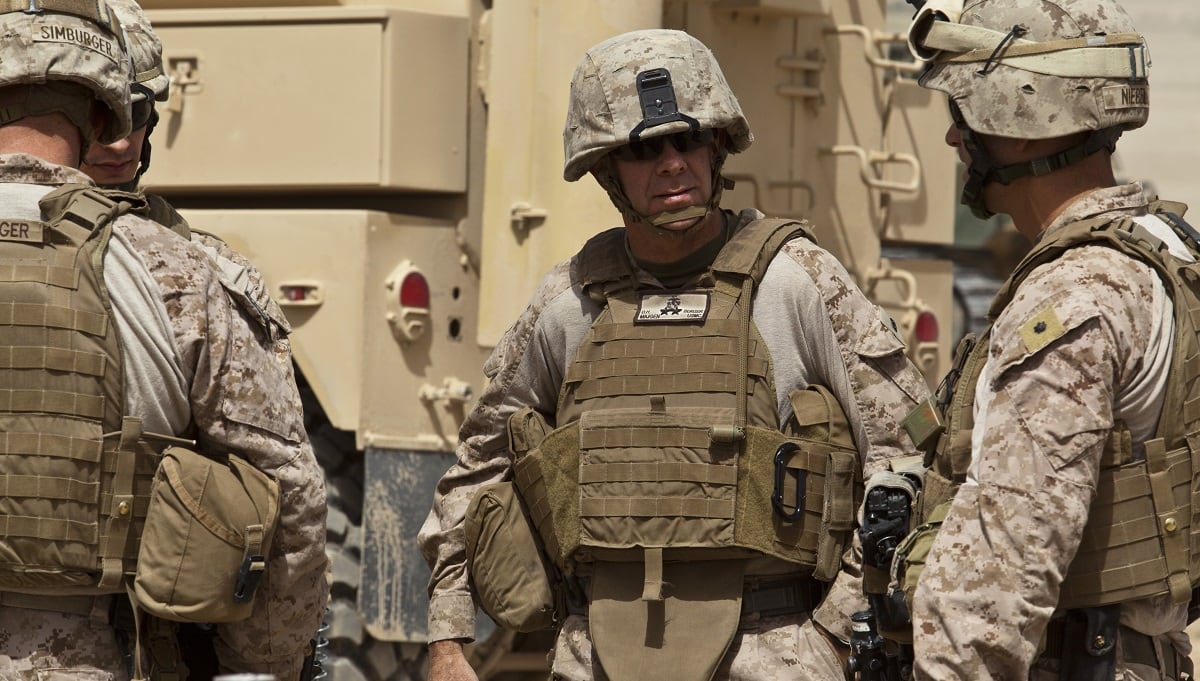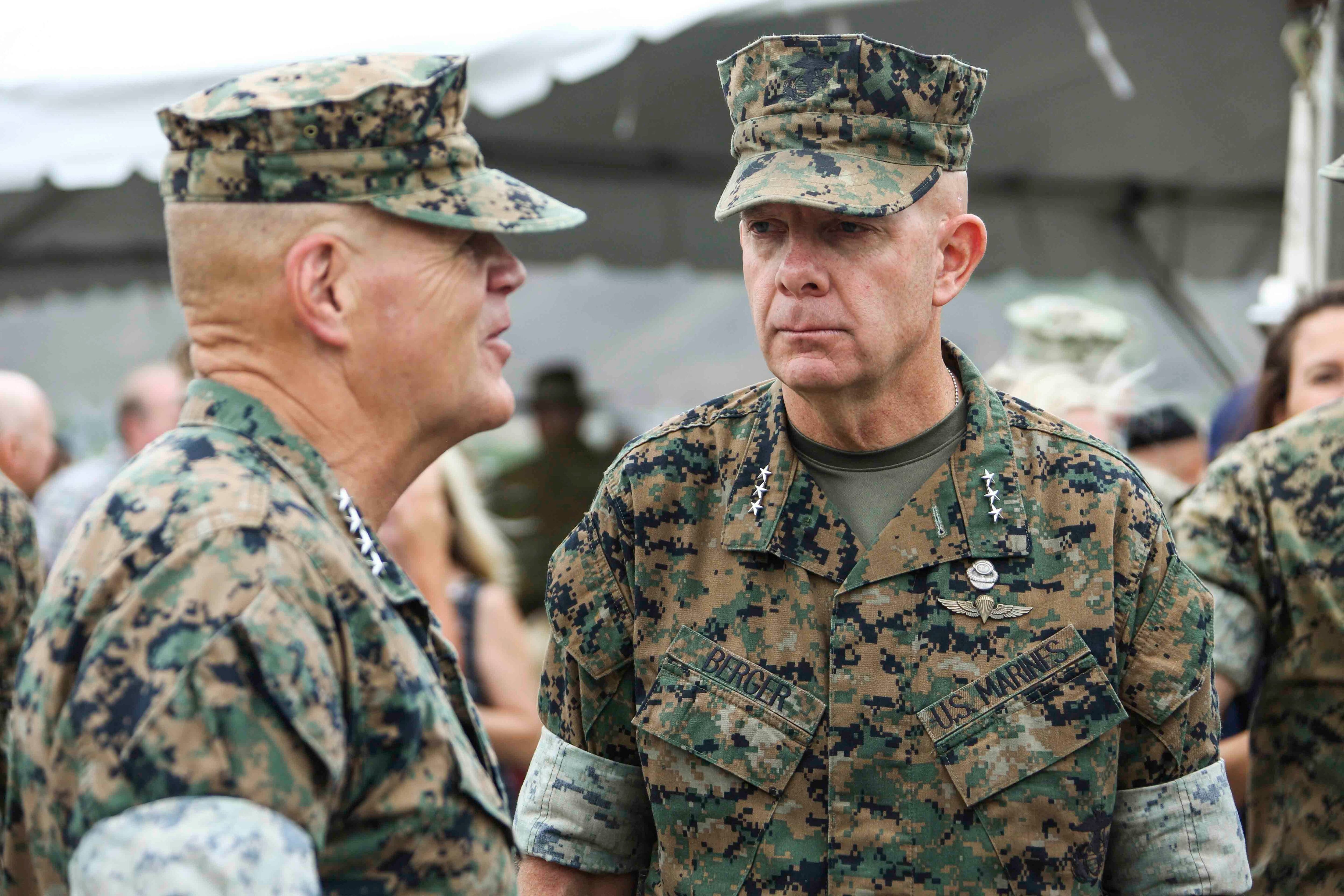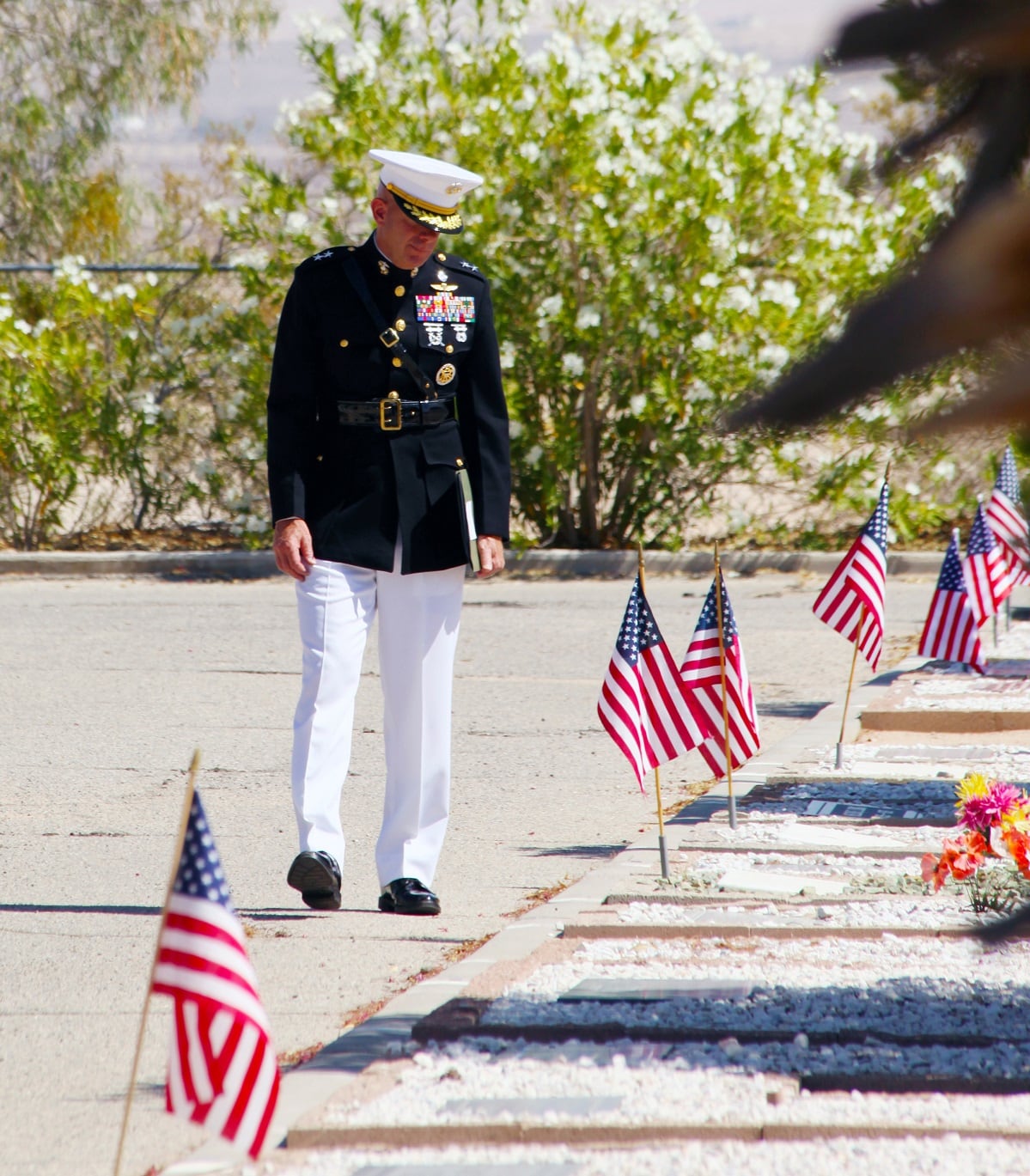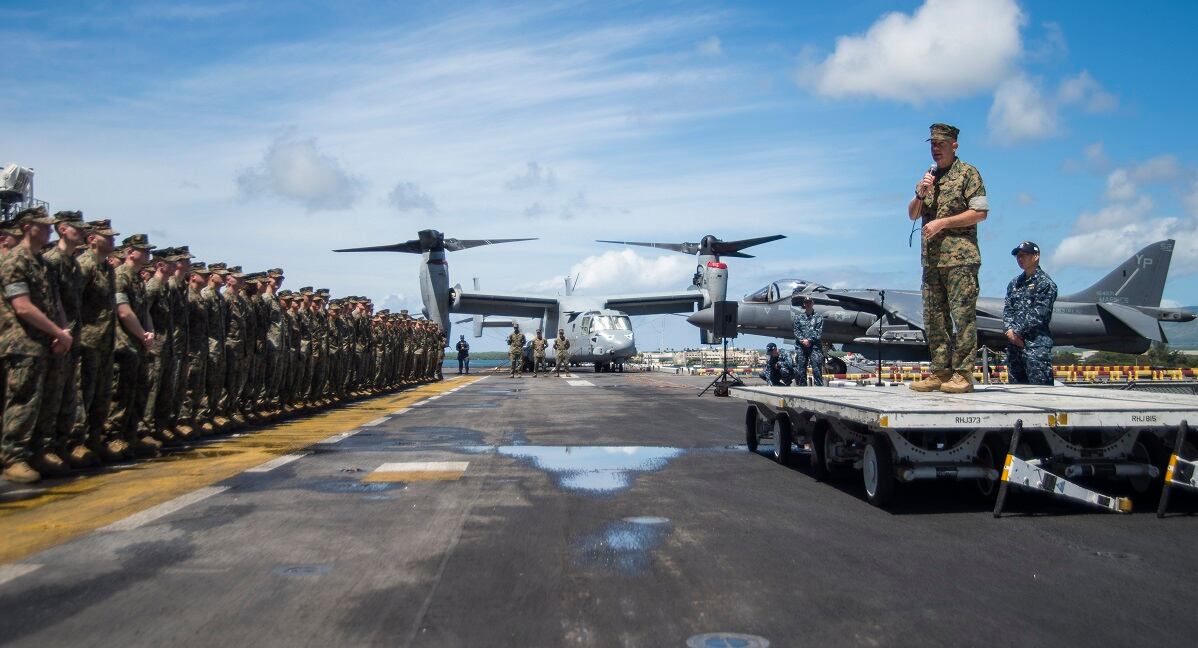“I shall never quit.
To quit, to surrender, to give up is to fail. To be a recon Marine is to surpass failure; to overcome, to adapt and to do whatever it takes to complete the mission.”
It’s a snippet of the creed of the Corps’ storied reconnaissance Marines, whose history is steeped in the early days of the small rubber boat units that were tasked with raiding Japanese positions during World War II.
It’s a message that has captivated the minds of many young Marines wishing to join the Corps’ commando ranks. It may have even inspired Lt. Gen. David H. Berger, who was once the company commander and battalion operations officer for 2d Reconnaissance Battalion, and now is nominated to become the Corps’ 38th commandant of the Marine Corps.
The three-star general is a graduate of the Corps’ arduous Amphibious Reconnaissance School and the Army’s elite Ranger school. And if confirmed by the Senate, he may be the Corps’ first “dual cool” commandant — a popular term among the recon community to describe a Marine who has graduated from both dive and jump school.
Berger’s ascent to becoming the top Marine fights against norms from the Corps’ recon Marines, norms saying the commando ranks are a career killer for those seeking to climb the promotion ladder. And, his nomination may signal the Corps’ sprint to confront the re-emergence of great power competition rising in the Pacific.
At least two former commandants have hailed from the recon field.
Alfred M. Gray, the 29th commandant, was previously an enlisted recon Marine who achieved the rank of sergeant in the early 1950s before receiving his commission. The Corps’ 28th commandant, Gen. Paul X. Kelley, served with Marine Force Reconnaissance.
“If you ever want to go to a recon unit, don’t stay long and don’t ever go back,” was advice Ret. Maj. Fred Galvin recalled hearing from an instructor when he was a student at the Infantry Officer Course. “You are infantry officers and you need to be leading infantry Marines. Recon is a career killer.”
Galvin, a former recon officer and commander of one the first Raider teams to deploy Afghanistan, told Marine Corps Times that the notion of recon as a career killer was the norm until the kick-off of America’s embroilment in counterinsurgency conflicts in Iraq and Afghanistan.
Berger himself did not remain in recon. He eventually went back to the infantry, serving as an infantry battalion commander and regimental commander.
He commanded Regimental Combat Team 8 in Fallujah, Iraq, and later commanded the 1st Marine Division in Afghanistan as a brigadier general in 2012.
Galvin says Berger embodies the hallowed recon creed, and his leadership style echoes those of legendary World War II Raiders like Lt. Col. Evans Carlson.

Carlson, a three-time Navy Cross recipient, was a pioneer for one of the Corps’ first special operations units dubbed the Marine Raiders, which was tasked with raiding Japanese units in World War II.
The Raider name has since been adopted by the current Marine Forces Special Operations Command — though the Raider lore is still steeped in both the recon and Marine special operations community.
Galvin told Marine Corps Times that he briefly served under Berger when he commanded Marine Forces Pacific, and that Berger would hold gatherings in his residence where staff could ask questions to better gauge his intentions as commander.
Galvin explained that he had rarely seen this approach by other leaders, but that it was a similar leadership approach used by Carlson when he commanded the 2nd Marine Raider battalion in 1942.
Those meetings enabled Marines to speak about anything in front of the command.
Carlson’s meetings with his men in World War II would become known as “Gung Ho” meetings, a means to democratize the military, foster comradery and educate the men about the mission and the war — a philosophy of military command he developed working with the Chinese military before the break out of World War II.
“This town meeting mentality enabled Carlson to discuss his expectations and philosophies without the multiple filters and editorial comments of lower-echelon leaders,” then-Air Force Maj. Kathleen M. Gomrick wrote in a research paper for Air Command and Staff College-Air University in 1999. “While never abdicating his position of authority, he fostered an atmosphere of accessibility felt by each Marine.”
“His goal was to promote an understanding that would lead to each member having a personal stake in the mission, a sense of responsibility to each other and to the outcome of the battle and the war,” Gomrick wrote in her research, titled “Gung Ho, Raider! The Philosophy and Methods of Brig Gen Evans F. Carlson, Marine Corps Raider.”
RELATED

Berger, Galvin said, “is a leader who truly cares for those in his command and it was visible in the few short months I observed before he transferred to command [Marine Corps Combat Development Command].”
While recon historically has been perceived as a career stopper, some recon Marines point to a few notable contemporary successes.
Marine Corps Lt. Gen. John K. Love is the U.S. senior military representative to NATO and served in 1st Reconnaissance Battalion. Though he didn’t remain in the recon community either, he would also command Regimental Combat Team 8 in Iraq, in 2009.
Brig. Gen. Francis L. Donovan commanded task force 51, 5th Marine Expeditionary Brigade, headquartered out of Bahrain. Donovan served in Force Reconnaissance, and as a lieutenant colonel he was an early pioneer of an experimental unit known as Det One, which was the precursor to the current Raider units today.
Following the deactivation of Det One, Donovan would go onto command 2d Battalion, 1st Marines.
Leading the next fight
Berger’s nomination to lead the Corps is not just about his recon background, but possibly is a signal of the Corps’ direction as the debate rages about the force’s mission to either focus on irregular, small wars or prep for a near-peer fight with sophisticated adversaries.
The Corps is at a crossroads while it modernizes for the future battlefield, pushing higher tech and costly platforms like the F-35B, CH-53K and new long-range weapon systems. This is all while some lawmakers have pondered if the right role for the Corps is focusing on low-intensity conflicts.
Ret. Marine Lt. Col. Dakota Wood, a senior research fellow for the Heritage Foundation, welcomed Berger’s nomination to lead the Marine Corps and noted that it was an indicator of the Corps heading to address the return of great power competition and the direction of the current National Defense Strategy.
Berger boasts a resume to lead a force prepping for the near-peer fight, according to Wood, who cited his tenure as commander as I Marine Expeditionary Force, or I MEF, and his time in the Pacific devoted to sea power and maritime operations as important facets to a potential fight with China.
I MEF is known as the “big war MEF,” Wood explained, where the unit is central to major war planning, where Berger is now “steeped in that culture.”
The nomination “says a lot about the administration’s [President Donald Trump’s administration] view of the world and what the military establishment needs to focus on,” Wood said.
Berger is the current commander of Marine Corps Combat Development Command/Deputy Commandant for Combat Development and Integration, headquartered at Quantico, Virginia.
In that role, he has been pivotal in pushing concepts, training and equipment central to the near-peer fight such as distributed operations, maritime environments and littoral operations.
But, the 31st Commandant of the Marine Corps Ret. Gen. Charles Krulak warned that the Corps must remain ready to fight across the spectrum of warfare and that a focus on near-peer adversaries risks turning the Corps into a second land army — a place he says is bad for the Corps.
“If we spend too much time thinking that we’re going to be fighting the near-peer competitor, we’re going to find ourselves back as a land army,” Krulak told Marine Corps Times in an interview.
While the Corps can serve as the lead punch in a major fight with a country like China, Krulak says the Army should serve as the main force, which he described as the “chainmail fist of American diplomacy.”

“They’re not going to go up against a billion Chinese and expect to come out on top,” Krulak said about the Marine Corps.
The Corps is about winning battles, Krulak explained, and if the Corps wins enough battles a war will not happen.
If Berger is confirmed by the Senate he will take the mantle of leading the Corps into the future.
While the current top Marine, Gen. Robert B. Neller, has pushed much modernization, to include an overhaul of the Corps’ rifle squads and the dishing out of new gear and vehicles, there is much work to be done.
Krulak says that prepping for the future fight must go beyond equipment and that the Corps must invest in the training and education of Marines.
The complexity of the future battlespace will thrust immense responsibility onto junior noncommissioned officers who may find themselves operating across the spectrum of war in a tight geographic space.
Because of this, young Marine enlisted leaders need proper training and education to prepare for the future fight.
“Don’t man the equipment, equip the man,” Krulak said. It’s all about properly “equipping the mind.”
“Training is preparation for the expected, education is preparation for the unexpected,” Krulak said. “We are seeing the unexpected in the world today.”
Krulak’s advice to the Corps is to relook at the concept of the strategic corporal and the strategic lieutenant as the force modernizes.
Much of Krulak’s vision for a future Corps has slowly been coming to fruition over the past twenty years, and Berger’s tenure as commandant may see that baton continue to move forward.
The Corps already has made strides in overhauling professional military education and removing barriers to earning college credit while Marines serve on active duty.
Krulak likes to cite a profound passage from Sun Tzu’s “Art of War,” which he believes the Corps should take to heart as it modernizes:
“Regard your soldiers as your children and they will follow you into the deepest valleys; treat them as your beloved sons and they will be with you even unto death.”
“Strong words with a powerful promise,” Krulak said. “That’s the guys we’re going to fight.”
“That’s John Lejeune saying teacher to scholar, father to son,” Krulak said.
Lt. Gen. John Lejeune served as the 13th commandant of the Marine Corps.
Those words may serve Berger, a man whose leadership traits and history hail from legendary Raiders like Carlson, who placed important emphasis on small-unit leadership and open communication among the ranks to foster participation and educate his men about his command intentions and their own stake in the coming battle.
Shawn Snow is the senior reporter for Marine Corps Times and a Marine Corps veteran.




